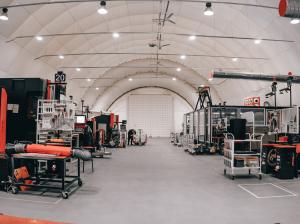The Future of Construction Looks Green
Cuby Technologies aims to make a wasteful industry ecologically friendly by changing the way buildings are made.
Waste is implicit in the building of new structures. According to a 2011 report by Science Direct, as much as 30% of all building materials delivered to a typical construction site can end up as waste. In fact, construction and demolition creates more than 600 million tons of waste debris each year – more than double the amount of municipal-generated waste (1). Annual construction waste is expected to reach 2.2 billion tons globally by 2025.
With Cuby lean manufactured buildings, the very nature of precise, software-controlled methodologies can reduce the waste generated at a construction site by as much as 90% because every part is accounted for. If only one-half of 1% of all new construction switched to the Cuby method, the United States would save an estimated 8.1 million tons of waste per year.(2)
While other modular and prefab and modular building techniques save on construction waste, their single-location mega-factories require that their completed boxes and building parts be trucked to different locations often hundreds, if not thousands of miles away. A study by the EPA found that 23% of carbon dioxide emissions from transportation comes from heavy- and medium-duty trucks such as the ones required to ship modular and prefab building parts. Unlike traditional modular or prefab building concepts, Cuby’s franchisee builder or developer will utilize solar-powered (coming soon), localized mini-factories Cuby calls TTFs (Turnkey, Transportable Factories). These TTFs can be placed on or within miles of construction sites. With localized factories, the emissions from shipping will be drastically reduced – as much as four tons of carbon per home.
Not only will Cuby’s construction process save waste and energy, but their finished buildings will continue to save energy. In tests conducted on Cuby’s first prototype building, Cuby rated an A+ energy efficiency ranking. The composition of a Cuby-built structure has a higher degree of thermal insulation and tightness of the building envelope, requiring less energy to heat and cool. Cuby structures are built with a drainage system that allows for the collection of rainwater that can be used to water landscaping. Cuby structures will use solar energy and will have smart-home zoned-heating and cooling systems, which are more energy-efficient than centralized air and heat.
To offset the carbon emissions caused in the production of concrete, Cuby Technologies is developing a proprietary use of Miscanthus, a form of grass, as a variable within its concrete composite. Use of Miscanthus grass will make Cuby’s concrete carbon-neutral, or possibly even carbon-negative.
About Cuby
From a seed of an idea in 2018 to address the often-archaic construction methods that have essentially remained static for over 200 years, Cuby Technologies was born. The brainchild of inventor/physicist and deep tech, repeat entrepreneur, Aleh Kandrashou, who joined forces with real estate professional and PropTech expert, Aleks Gampel, the company has to date invested over 100,000 engineering hours into this concept of constructing multiple building types through a proprietary process, design, and technology.
Its key differentiator is the ability to erect turnkey, transportable factories in a matter of days to bring the entire off-site production on-site, making construction more efficient, scalable, predictable, sustainable, and cost-effective. With the concept already proven in Europe, Cuby Technologies is mere months away from bringing its cutting-edge concepts to the United States and has already begun selling its factories as a service.
Within the coming year, Cuby factories will be available on a franchisee-type model for home builders and developers to buy and license. Cuby Technologies is currently developing both hardware and software, launching factories, and manufacturing case studies. Learn more at: https://www.cubytechnologies.com/
______________________________
(1)-Environmental Protection Agency, “Sustainable Management of Construction and Demolition Materials,” (2018 Fact Sheet) https://www.epa.gov/smm/sustainable-management-construction-and-demolition-materials
(2)- Transparency Market Research, “Construction Waste Market – Global Industry Analysis, Size, Share, Growth, Trends, and Forecast 2017-2025”, (Ongoing) https://www.transparencymarketresearch.com/construction-waste-market.html
Melinda Lyons
Cuby Technologies, Inc
email us here
Visit us on social media:
Facebook
Twitter
Cuby Building Assembly
Legal Disclaimer:
EIN Presswire provides this news content "as is" without warranty of any kind. We do not accept any responsibility or liability for the accuracy, content, images, videos, licenses, completeness, legality, or reliability of the information contained in this article. If you have any complaints or copyright issues related to this article, kindly contact the author above.



